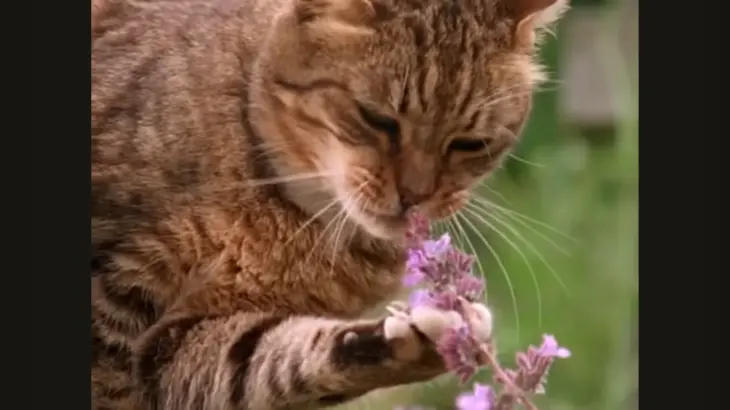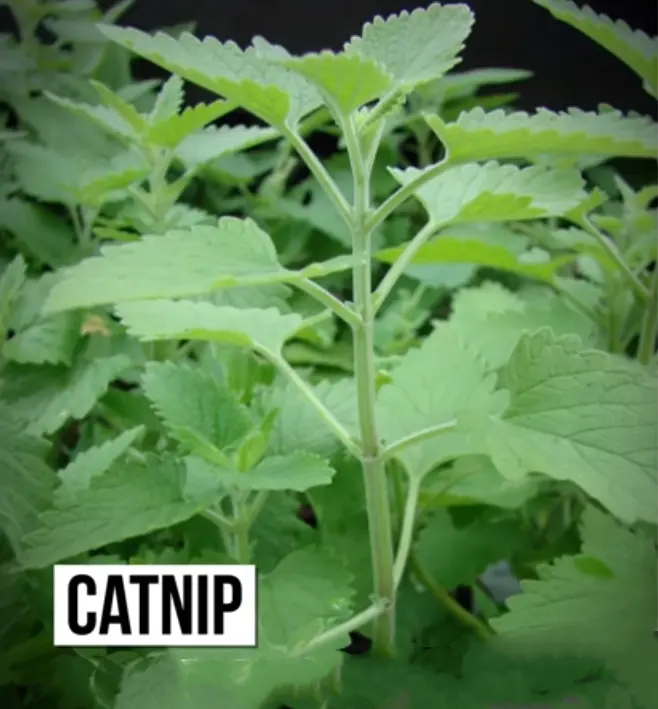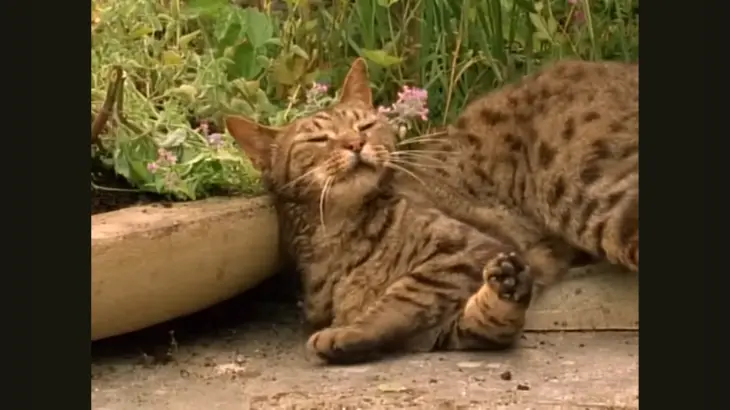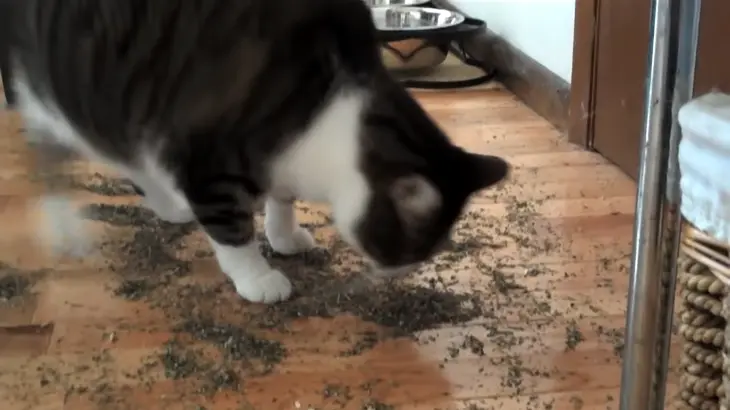Why Do Cats Love Catnip? What Is It Good For?
By: Lana Koh

The information in this article is intended to educate cat parents and is not a substitute for veterinary guidance. In case of any concerns about your cat’s health, please talk with your veterinarian.
The bond between cats and their owners often brings joy, excitement, and moments of pure fun. Yet, there’s a special herb that elevates this connection, providing an unparalleled source of relaxation and exhilaration for our feline friends—catnip.
When cats encounter this intriguing plant, their behavior can transform in fascinating ways. The active compound in catnip, nepetalactone, interacts with specific receptors in a cat’s brain, mimicking the effects of pheromones and triggering a delightful array of antics.
Click here to learn: Why Do Cats Knead?
You may be wondering why cats are so enchanted by catnip, whether all felines respond to it, how long its effects last, and much more. Join us as we explore the captivating world of catnip and uncover the science behind its allure for our beloved pets.
What Is Catnip?
Catnip is a perennial herb that belongs to the mint family. It is filled naturally with an oil, nepetalactone. When cats smell or eat catnip, it causes them to behave strangely and amusingly, like rolling around, meowing, and generally acting a bit crazy for a few minutes.

What Are The Other Names For Catnip?
Catnip is also known by other common names such as Catmint, Fieldmint, Catswort, and Catnep. Its scientific name is Nepeta Cataria.
Where Did Catnip Come From?
Catnip is native to Europe, Central Asia, and parts of the Middle East. Afterwards, it was introduced to North America, and now it grows freely all over the United States and Canada, even worldwide.
Different Uses Of Catnip
In addition to being a cat attractant, catnip has many other uses for humans. It can be brewed into a calming tea, used as a natural insect repellent, and has some medicinal properties when ingested.
How Does Catnip Work?
The secret behind catnip’s rapid effects on cats lies in its chemical compounds. Catnip contains nepetalactone, an aromatic terpenoid compound commonly known as an oil. When a cat smells nepetalactone, it triggers receptors that respond to cat “pheromones” or chemical communication signals. As a result, cats start behaving differently.
What Does Catnip Do To Cats?

Exposure to catnip causes noticeable changes in a cat’s behavior. They may start rolling around, pawing at the air, meowing, zoning out, and engaging in repetitive motions like licking or chewing.
Some cats become mellow and calm, while others become energetic and hyperactive.
Related: Why Do Cats Drool?
Why Do Cats Love Catnip?
There are scientific reasons why cats are drawn to catnip and react to it so positively. Scientists believe the effects of nepetalactone make cats act like they’re responding to ‘pheromone’ produced when cats sweat. This makes them do things to play or act on their hunting instincts, like:
- Marking territory by rubbing and rolling
- Hunting movements like chewing, licking, and biting
- Increased affection and sexual activity
Catnip makes cats react naturally like they’re mating, hunting for prey, or marking their territory. It’s an intense but pleasurable experience for cats.
Also Read: Sounds Cats Hate?
How Long Do The Effects Of Catnip Stay?
The excitement of catnip is fleeting, lasting only about 5 to 10 minutes for most cats. After experiencing the intense effects, a cat may lose interest in the catnip for approximately 30 minutes to 1 to 2 hours. This temporary desensitization occurs as the cat becomes accustomed to the catnip, rendering it less responsive for a short period.
Do All Cats Respond To Catnip?
No, catnip doesn’t affect all cats. Experts estimate that around 30% of cats don’t have any reaction at all. The catnip response is also hereditary, so some breeds may be more likely to respond than others. Kittens under 3-6 months old usually don’t react until they reach sexual maturity.
Also read: Do cats like to be petted?
How To Give Your Cat Catnip?

There are a few different ways to introduce catnip to your feline friend :
- Fresh Catnip: Consider growing fresh catnip in a pot at home. Your cat can nibble on the leaves directly, providing a natural and aromatic experience. Fresh catnip can be more potent and enticing than dried options.
- Dried Catnip: Sprinkle dried catnip on your cat’s favorite toys, scratching pads, or bedding. This will entice them to engage in play or scratching, helping redirect their behavior to appropriate outlets. Rotate new and old toys with catnip regularly to keep things exciting.
- Commercial Catnip Products: Explore a variety of commercial catnip products available on the market, including sprays, bubbles, and catnip-filled toys. These products can add an exciting twist to your cat’s playtime.
- Moderation is Key: While catnip is generally safe, it’s essential to offer it in moderation. Excessive consumption can lead to digestive upset, so start with a small amount and observe how your cat reacts.
- Observe Your Cat’s Reaction: Every cat responds differently to catnip. When introducing it, monitor your cat’s behavior for any signs of excitement or adverse reactions. Adjust the amount you offer based on their response.
By incorporating these methods, you can create a fun and stimulating environment for your cat while ensuring their well-being!
Is Catnip Bad For Cats?
When used in moderation, catnip is perfectly safe and non-addictive for cats. Signs your cat may develop include vomiting, diarrhea, or lack of coordination. As long as you limit portions and take breaks, catnip is an enjoyable, safe treat.
Does Catnip Affect Humans?
While catnip can have a relaxing and sleepy effect when consumed as a tea or supplement, the nepetalactone compound doesn’t cause any psychoactive high in humans. We don’t have the same receptors as cats to trigger the “catnip crazies.” However, certain individuals mention experiencing increased relaxation after consuming catnip for the treatment of achy joints, trouble sleeping and migraines.
Do Any Cats Hate Catnip?
While most cats simply don’t react to catnip at all, a very small percentage, about 30% of cats, seem to actively dislike or even fear catnip. This could be due to an unusually high sensitivity to the nepetalactone compound. If your cat appears afraid or stressed by catnip, it’s best to avoid exposing them to it.
How To Use Catnip For Training
Catnip can help train your cat by rewarding good behaviors. Sprinkle some catnip inside puzzle toys or on scratching posts. This will make your cat want to play with the toys and use the scratching posts, which are good things.
Also read: When do kittens calm down?
You can also treat your cat catnip as a special treat when training with a clicker. But don’t give too much catnip during training. Your cat sometimes needs a break from catnip, so it doesn’t stop working. If you give too much catnip, your cat won’t care about it anymore for a while.
Frequently Asked Questions
Conclusion
Catnip is an irresistible herb for many cats, thanks to its active compound, nepetalactone. When exposed to catnip, cats often exhibit amusing behaviors, such as rolling, playful meowing, and even moments of sheer joy. For some, catnip can induce a state of calm and relaxation, while others may experience bursts of energy, darting around with lively enthusiasm.
These excited and playful behaviors are temporary, typically lasting only a short while, after which cats may become temporarily immune to its effects. Catnip can also be a valuable tool for training, enriching playtime, and allowing cats to express their instincts related to hunting and territory marking. With its safety and harmlessness, catnip is a joyful addition to your feline friend’s life—as long as it is offered in moderation. Watching your cat indulge in the wonders of catnip not only entertains but also strengthens the bond between you and your furry companion.
